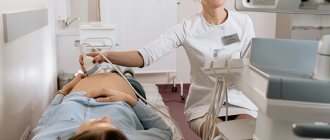Why can menstruation be delayed?
The reasons for missed periods are varied:
- pregnancy;
- gynecological diseases;
- change of climate or time zone;
- strong emotional disturbance;
- heavy physical activity;
- strict diet;
- presence of bad habits;
- the beginning of menopause;
- side effects of certain medications.
The most common reason for delayed periods in teenage girls is hormonal instability. It may take up to a year after your first period before your cycle settles and becomes regular. The delay in menstruation ranges from 5-7 days to a month or more.
Physiological causes of menstrual irregularities include fasting, emotional disturbances, and physical activity. In this case, the coherence of the pituitary-ovarian system and hormonal levels are disrupted. This leads to a delay in menstruation for a long time - until the impaired functions are restored.
A delay in menstruation can be caused by a severe cold or other infectious disease. This is a kind of stress for the body, so all physiological processes slow down.
The reason for a delay in menstruation may be a medical termination of pregnancy. To do this, they use a shock dose of hormones, which creates an imbalance in the body. For two to three months, menstruation comes late or does not come at all.
The reasons for delayed periods after 30 years, in addition to pregnancy, can be various diseases of the female reproductive system:
- ovarian cysts and tumors;
- uterine fibroids;
- obstruction of the fallopian tubes;
- adhesions in the pelvic cavity.
The reason for delayed periods after 45 years is the onset of menopause. The function of the ovaries begins to fade, they produce less hormones. Therefore, the menstrual cycle becomes unstable and then stops completely.
Timing of implantation
After ovulation and the meeting of the egg with the sperm, the fertilized zygote begins to move through the fallopian tubes. Its task is to get into the uterus as quickly as possible in order to gain a foothold in the endometrium specially prepared for this. Along the way, the zygote continuously divides and grows. occurs at the blastocyte
Conventionally, we can distinguish between middle, late and early implantation.
- Early. It is quite rare. Usually, implantation that occurs 6-7 days after ovulation is considered early (or 3 dpp - 4 dpp if we are talking about IVF)
- Average. 7-10 days pass between fertilization and implantation ( implantation of the embryo after transfer occurs approximately 4-5 days). Doctors say that it takes about 40 hours for morula to penetrate, after which the body begins to produce the hormone hCG in the blood, and the basal temperature . Based on this, the so-called embryonic period of development, which lasts until approximately 8 weeks of pregnancy.
- Late. Occurs approximately 10 days after fertilization. This is what always gives women at least a faint hope of a possible pregnancy - even when you can hardly expect it anymore.
If pregnancy does not occur for a long time, then you need to be examined to identify the cause of infertility.
Signs and diagnosis of menstrual disorders
The main sign of menstrual dysfunction is the absence of menstrual bleeding 5-7 or more days after the expected date of menstruation.
In this case, spotting bloody discharge and profuse leucorrhoea may appear.
Symptoms that accompany cycle disorders:
- discomfort or pain in the lower abdomen;
- chest pain;
- general malaise;
- nausea;
- the appearance of acne;
- weight gain;
- Excessive body hair growth.
Symptoms of a missed period include emotional disorders. The woman’s mood changes - she becomes irritable, whiny. Girls get tired quickly and their libido decreases. All this points to hormonal disorders.
If menstruation is absent for 6 months, a preliminary diagnosis of amenorrhea is made. In such cases, it is imperative to contact a gynecologist and undergo the necessary medical examination.
To identify the cause of cycle disruption, the doctor conducts an examination:
- gynecological examination;
- smears for flora and atypical cells;
- blood tests for hormones;
- instrumental diagnostics - ultrasound, x-ray.
Sometimes a trial treatment with hormonal drugs is prescribed for diagnosis.
Why does the lower abdomen hurt and what to do about it?
The uterus is the most important organ of the reproductive system of every woman. The most common complaint in gynecologist practice is pain in the lower abdomen. This symptom can occur with various diseases (endometriosis, menstruation, the presence of tumors, etc.). Pain in the lower abdomen can develop with an enlarged uterus, which puts pressure on neighboring organs - the bladder, intestines. If you experience pain in the lower abdomen, you should immediately consult a gynecologist to determine the causes of the pain and prescribe the necessary treatment.
Causes of pain when menstruation is delayed
It often happens that when menstruation is late, the lower abdomen hurts. The reason for this is concomitant diseases. Thus, a delay of menstruation for more than a week, accompanied by nagging pain in the lower abdomen, indicates the possibility of an ectopic pregnancy.
Purulent discharge with an unpleasant odor, foamy, profuse, indicates genitourinary infections. If bacteria cause inflammation of the uterus, menstruation does not occur on time, and pus is released instead of blood. General well-being also suffers - body temperature rises and malaise occurs.
The absence of menstruation, combined with swelling of the mammary glands and mild discomfort in the chest, most likely indicates pregnancy. If the pain is severe, lumps are felt in the chest - this could be mastopathy or a tumor of the mammary glands, you need to see your doctor.
What to do if you don’t have your period and the test is negative
If your period is delayed by only a couple of days, do not rush to draw conclusions about the onset of pregnancy or the appearance of any diseases. When menstruation does not start for 5-7 days, you can take 1-2 pregnancy tests to ensure the accuracy of the result. If both tests turn out to be negative, this is a reason to contact a gynecologist as soon as possible. In this case, you should not wait long in line at a public clinic; it is best to make an appointment at a paid hospital.
The most important thing in such a situation is not to try to induce menstruation yourself using traditional methods, as this can lead to severe uncontrolled bleeding and exacerbation of a gynecological disease, if any. The menstrual cycle is regulated by hormones, so it is possible to interfere with its course only with the help of special medications prescribed by the attending physician.
Consequences of delayed menstruation
The consequences of delayed menstruation depend on the cause of the cycle disruption. If this was associated with conception, the pregnancy will further develop. If the cause is an ectopic pregnancy, surgery may be necessary.
Cycle disruption associated with external causes - diet, stress - will progress as long as exposure to these factors continues. The outcome is complete hormonal depletion. The same result is observed in diseases of the reproductive system. Without adequate treatment, hormonal imbalance increases, amenorrhea and secondary infertility occur.
Diagnostics
A long delay in menstruation is a dangerous symptom. It may indicate the development of serious pathologies. Therefore, if there is a delay of more than 3-5 days, it is necessary to undergo diagnostics at a medical institution.
First, a traditional gynecological examination is performed, which allows you to confirm or exclude the presence of:
- Inflammatory processes.
- Pregnancy.
- Cysts.
- Neoplasms.
After this, be sure to check the condition of the pelvic organs, thyroid gland and adrenal glands using ultrasound. These instrumental examinations make it possible to clarify the diagnosis and determine the purpose of other diagnostic methods. The necessary hormonal studies are also carried out in parallel.
How to establish a cycle - treatment
Gynecologists treat menstrual irregularities. Treatment tactics depend on the cause of the delay. If the reasons are external factors, you need to remove them:
- establish adequate nutrition;
- to refuse from bad habits;
- limit stress;
- Avoid heavy physical activity.
If this is done on time, it is possible to restore the cycle without hormonal drugs or surgical interventions.
If the cause is a disease of the reproductive system, the doctor may additionally prescribe:
- a course of hormonal drugs;
- antibiotics or antifungals.
When malignant tumors are detected, treatment tactics are selected individually. An assessment of the clinical stage of the tumor is required. Depending on this, the main treatment is chosen - surgery, chemotherapy, radiation therapy, hormones, etc. management tactics are determined by the attending physician.
Pain in the lower abdomen in women in questions and answers
Pain in the lower abdomen
is the most common complaint in gynecological practice.
This symptom is very non-specific, as it occurs in many diseases. Today, many people have non-steroidal anti-inflammatory drugs (NSAIDs) in their medicine cabinet. The choice is wide, and the doctor and pharmacist must orient the woman in the possibilities of certain drugs and warn her, reminding her of the importance of a timely visit to the doctor, as well as answer all questions. Complaint: pain during menstruation
How it begins: 1) One day before or on the 1st day of the menstrual cycle.
Continues during the first 2-42 hours or throughout the entire menstruation. 2) In the 2nd half of the cycle, it reaches its peak during menstruation. 3) During menstruation. How does it hurt?
The pain is often cramping in nature, but can be aching, tugging, bursting, and can radiate to the rectum.
Severe, often spasmodic pain. What else is worrying?
1) Irritability, depression, nausea, chills, dizziness, fainting, headache, swelling (possible dysmenorrhea).
2) Pain during sexual intercourse, periodic pain during urination, defecation (possible endometriosis). 3) Prolonged or too intense menstrual bleeding. Sometimes bleeding outside of menstruation. There may be an increase in the volume of the abdomen and a frequent urge to urinate (possible uterine fibroids).
Caution: acute pain
Acute intense and/or unilateral pain in the lower abdomen may indicate a gynecological emergency: - perforation or rupture of tumors and tumor-like formations of the ovaries;
- torsion of the anatomical pedicles of the ovary; - ovarian apoplexy; - intra-abdominal bleeding; - acute purulent diseases of the pelvic organs, etc., so consultation with a doctor is necessary. What can hurt?
The causes of pain in the lower abdomen can be very different: pathologies of the development of the genital organs, purulent-inflammatory diseases of the uterine appendages, endometriosis, diseases of the gastrointestinal tract (GIT) and urinary system. One of the most common causes of periodic lower abdominal pain in women is dysmenorrhea. Cyclic pain in the lower abdomen can be caused by endometriosis, polycystic ovary syndrome, sexually transmitted infections, and other serious diseases. Such dysmenorrhea is considered secondary, and treatment of the disease that caused it, as a rule, leads to complete recovery. Primary dysmenorrhea is characterized by the appearance of cyclic pain in the lower abdomen several hours before menstruation and in the first days of the menstrual cycle in the absence of any pathology from the pelvic organs. Primary dysmenorrhea most often occurs in young women.
Pain with dysmenorrhea:
- Reaches maximum intensity at the peak of bleeding. - It can be sharp, cramping, bursting or dull. - Most often it is localized in the midline in the suprapubic region, but may not be clearly localized. - May radiate to the lumbar region, rectum or thigh.
Or maybe it’s worth enduring the pain?
The multifaceted influence of pain syndrome on the human body determines its independent clinical significance.
Pain not only determines the severity of suffering and social maladjustment of the patient, but is also fraught with more serious consequences, for example, disruption of the normal function of organs, especially the cardiovascular system. Enduring pain is not recommended. What medicine will help?
The first stage of rational analgesic therapy is the elimination of the effect of the damaging factor (if possible), as well as the suppression of the body’s local response to damage.
For these purposes, drugs are used that block the synthesis of mediators of pain and inflammation. The main mediators of inflammation - prostaglandins (PG) - are actively synthesized in the area of damage with the participation of the enzyme cyclooxygenase (COX). It is important that the causes of damage (trauma, surgery, inflammation, swelling or ischemia of tissue, persistent spasm of striated or smooth muscles, etc.) do not matter, therefore the use of drugs that block COX and suppress the synthesis of pro-inflammatory PGs will help with any somatic or visceral pain. Well-known NSAIDs have this effect. In the case of dysmenorrhea, one of the main pathogenetic mechanisms is a high level of PG. An increase in their ratio in the menstrual endometrium leads to a contraction of the muscular elements of the uterus. PGs are secreted in almost all tissues of the genital organs: endometrium, myometrium, endothelium of uterine vessels, tubes, etc. An increase in their level leads to increased contractility of the uterus, against which vascular spasm and local ischemia occur, which manifests itself as pain. Moreover, the high level of PG detected during dysmenorrhea causes ischemia of other organs and tissues, which results in symptoms of dysmenorrhea such as headaches, dizziness, weakness, etc. In the treatment of primary dysmenorrhea, NSAIDs are one of the drugs of choice. Which is better, NSAIDs or antispasmodics?
The previously stated assumption about the comparable effectiveness of antispasmodics and NSAIDs in the treatment of primary dysmenorrhea has not found experimental confirmation.
In particular, antispasmodics were inferior to NSAIDs in terms of pain relief. Currently, antispasmodics are not included in the international standards for the treatment of primary dysmenorrhea. Thus, NSAIDs are recognized as the most effective drugs in the treatment of this pathology. Among the drugs widely used for dysmenorrhea, the most common are NSAIDs with a short half-life (dexketoprofen, ketoprofen, nimesupid, diclofenac, ibuprofen, indomethacin, etc.).
Which NSAIDs are the most effective?
There is no ideal NSAID, so an individual approach is required in each specific clinical situation.
On average, the therapeutic effect of different NSAIDs is the same with the appropriate dosage regimen. However, some studies have noted significant differences in individual response between individual patients. Thus, it is impossible to predict which NSAID will be most effective in a particular patient. NSAIDs are available in different dosage forms (tablets, suppositories, injections), which allows you to choose the form that is most suitable for a specific clinical situation. How to take NSAIDs for dysmenorrhea?
For dysmenorrhea, NSAIDs should be taken before the onset of symptoms or at the first manifestations (in the first 48-72 hours) due to the maximum release of PG in the first 48 hours. Short-term use of NSAIDs for dysmenorrhea has virtually no side effects or they are only slightly expressed.
Irritation of the gastrointestinal mucosa can be easily prevented by taking NSAIDs after meals or milk. Important!
Patients should not take NSAIDs: - with erosive and ulcerative lesions of the gastrointestinal tract, especially in the acute stage;
- with severe impairment of liver and kidney function; - with cytopenias; - in case of individual intolerance; - during pregnancy. Basic rules for the use of NSAIDs:
- use of the minimum effective dose for the shortest possible period of time necessary to achieve the therapeutic goal. - if there is no effect within 3 days of use, consult a doctor. Uncontrolled and long-term use of NSAIDs is unacceptable.
First aid for dysmenorrhea will be provided by the so-called “gold standard” NSAID - ibuprofen, and its capsule form is
IBUPROFEN CAPS
. Why in capsules?
The answer is simple. IBUPROFEN CAPS
is the “second modern generation” of ibuprofen in 200 mg capsules with the onset of the therapeutic effect within 15 minutes.
The advantage of IBUPROFEN CAPS
is the rapid onset of action.
And we need to quickly eliminate the pain. In addition, the capsules hide the unpleasant taste and ensure dosing accuracy. When taken orally, IBUPROFEN CAPS
, produced by
Minskintercaps
, quickly disintegrates and dissolves, achieving the maximum therapeutic effect within 45-60 minutes.
Another criterion based on which IBUPROFEN CAPS
is the presence of a number of clinical studies in Belarus and Russia, where the drug
IBUPROFEN CAPS
confirmed its biological equivalence to the original drug Nurofen ultracap.
Adults and children over 12 years of age can take Ibuprofen CAPS
to relieve pain, 1 or 2 capsules up to three times a day, keeping an interval of at least four hours between doses.
IBUPROFEN CAPS
is a modern, ultra-fast-acting form of ibuprofen.
based on materials from the magazine “Pharmacist’s Handbook”, No. 2, 2017
26 Jun 2019
Previous News Feed Next
Violation of the cycle and the presence of pain are reasons to consult a doctor
If your period is late, you should first take a pregnancy test. If it turns out to be negative, and the woman cannot attribute the delay to any physiological reasons, she should consult a doctor.
Depending on the duration of the delay and accompanying symptoms, the doctor recommends undergoing examination:
- hormone tests;
- ultrasound examination of the uterus, ovaries, fallopian tubes;
- hysteroscopy;
- smears from the vagina and cervical canal for flora and atypical cells;
- X-ray of the skull.
Based on the results of the examination, a final diagnosis is made and treatment is prescribed. If a woman does not see a doctor, the disease can progress and even cause infertility or damage to other organs. In extreme cases, endometrial ablation is performed, that is, surgical removal of the mucous membrane of the uterine cavity.
The usual cause of delayed menstruation is pregnancy. This can be determined using a hCG test. If the test is negative, then the delay in menstruation is associated with hormonal imbalances or diseases of the reproductive system. Relatively harmless causes of cycle disruption are a strict diet, stress, and physical overload.
A gynecologist will help you understand the reasons for delayed menstruation. You need to contact him in any situation if your period does not come on time.
Why is it important to know about early pregnancy?
During pregnancy, every week matters, but it is in the first trimester that the main internal organs of the child are formed. If you learn to correctly identify the first signs of conception, you can promptly adjust your lifestyle and diet to avoid miscarriage, and conduct early diagnosis to identify genetic diseases.
Often at the initial stage of pregnancy, symptoms similar to colds appear. If a woman suspects conception, medications that are safe to take in the first trimester should be selected.









